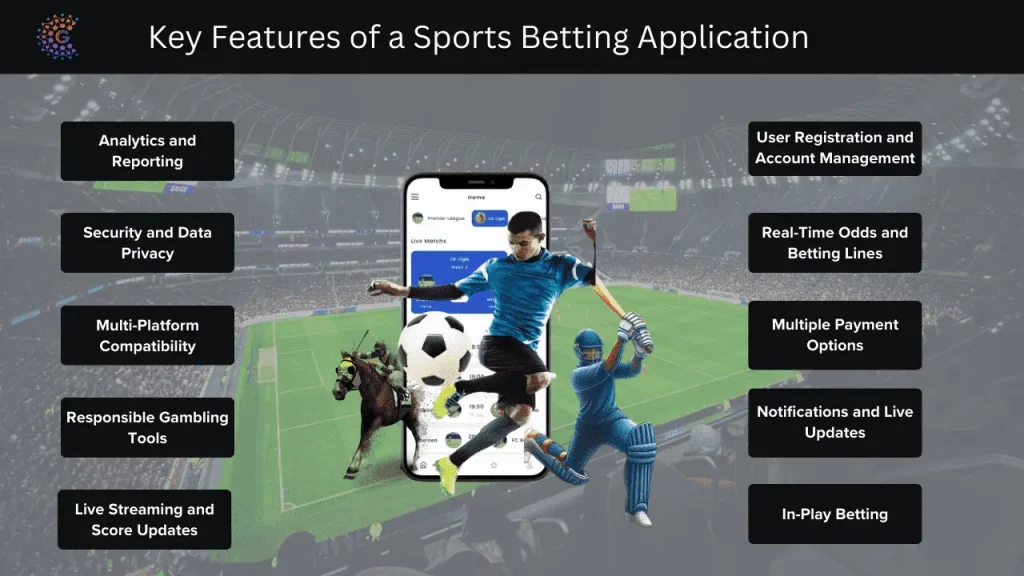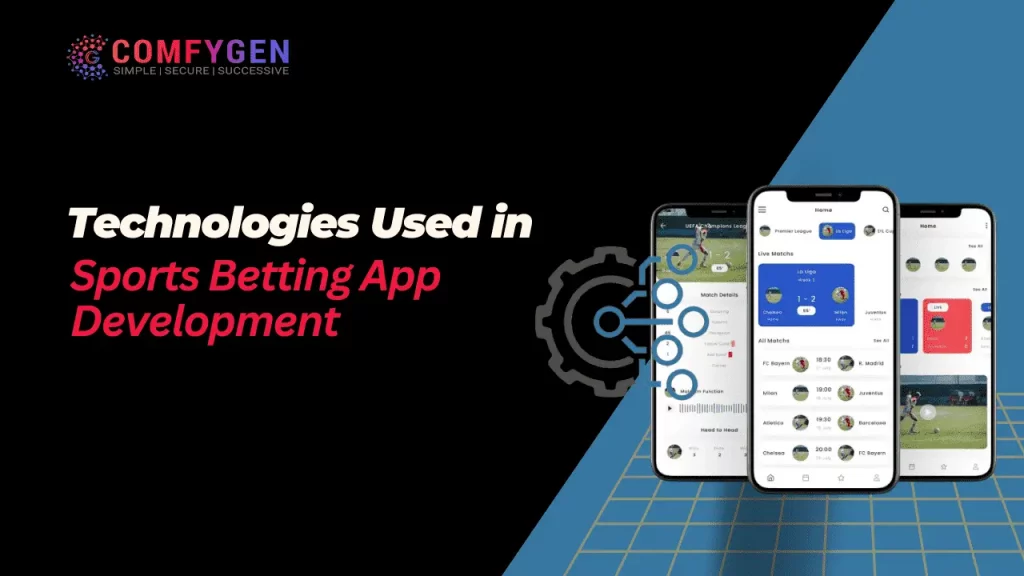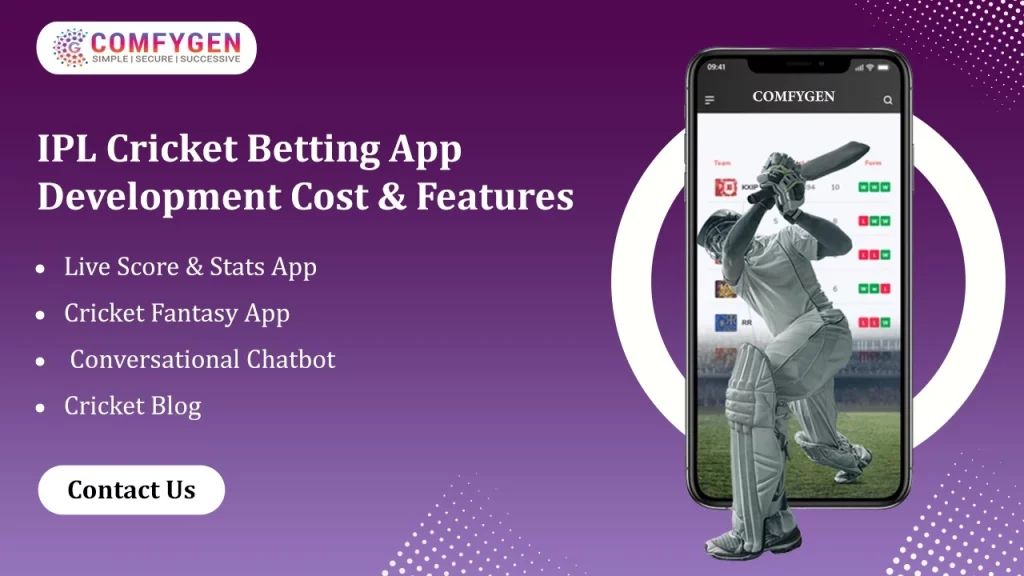
Sports betting app development company is providing dynamic and rapidly growing online sports betting industry that caters to the evolving interests of sports enthusiasts and bettors. With the increasing popularity of mobile sports betting, the demand for user-friendly and feature-rich mobile applications has surged. A well-developed mobile sports betting application service provides a seamless and immersive experience, allowing users to conveniently place sports bets on their favorite sports events.
To build a successful mobile sports betting application development, betting programmers need to consider various factors. User interface and experience play a crucial role in attracting and retaining users. The mobile sports betting app development services should have a visually appealing design, intuitive navigation, and smooth performance to enhance user engagement. Real-time updates and push notifications about live matches, odds, and results are essential to keep users informed and engaged.
Reliable data integration is paramount for accurate odds calculation and secure transactions. Seamless Sports Betting / Casino API Integration with third-party sports data providers is vital to ensure up-to-date and accurate information about matches, teams, players, and odds. Payment gateway integration with secure transaction channels provides users with a hassle-free and secure betting experience.
Reliable Sports Betting API Service Provider
Top Sports Betting app developers also need to incorporate responsible wagering features to promote ethical betting practices. These features can include setting deposit and betting limits, self-exclusion options, and providing information about responsible wagering organizations and helpline numbers.
Sports Betting Application Introduction
Sports betting apps have gained immense popularity in recent years, revolutionizing the way people engage with sports and wager on their favorite teams and athletes. These sports betting apps have become a cornerstone of the modern sports betting app development industry, offering a convenient and accessible platform for sports enthusiasts to indulge in their passion for online betting app.
Overview of Online Sports Betting Apps
Sports betting apps are smartphone applications that empower users to wager on a diverse array of sporting events and their outcomes. These sports betting applications feature a user-friendly interface showcasing an extensive spectrum of sports, spanning from football betting development services and basketball betting development services to cricket betting app and software development and horse racing betting development services, thereby facilitating users in placing sports bets on their preferred sports and events with effortless convenience. Furthermore, these apps boast a comprehensive array of betting possibilities, encompassing moneyline bets, point spreads, over/under bets, and more, ensuring they cater to the needs of both novice and seasoned bettors alike. Users also benefit from access to real-time odds, statistics, and Cricket live line streaming to the next level, all of which contribute to an enriched and immersive betting experience. The flexibility of being able to make wagers at any time and from any location has significantly fueled the widespread adoption of these apps.
Read More: Live Streaming to the Next Level with Powerful API
Importance of Sports Betting App Development

The significance of developing sports betting application development in the sports / game development industry has grown exponentially for a variety of compelling reasons.
First and foremost, the sports betting application development industry have greatly broadened the horizons of the sports betting market overview. These applications have democratically enabled individuals to partake in sports betting from the comfort of their homes or while on the move. This newfound accessibility has triggered a substantial increase in the number of participants in sports betting development, consequently amplifying the overall market size and its revenue potential.
Secondly, sports betting application development solutions have unlocked fresh revenue streams for sports leagues and sports betting application development organizations. Numerous sports leagues and teams have forged strategic alliances with betting companies, thereby promoting their events and presenting exclusive betting opportunities. This collaborative synergy has not only augmented the financial gains for these sports entities but has also fostered heightened interest and engagement among fans.
Read More: How To Start A Legitimate Fantasy Sports Business In India: Complete Guide
Understanding Sports Betting Application
sports betting application development company involves predicting the outcomes of sporting events and wagering money on these predictions. It’s a form of wagering where individuals analyze factors like team performance, player statistics, and other variables to make informed bets. Common types of sports bets include moneyline bets (betting on the outright winner), point spread bets (betting on a team to cover a specific point margin), and over/under bets (betting on the total points scored). Sports betting app development is a popular and widespread activity that adds excitement and engagement to various sports, from football and basketball to horse racing and beyond.
What is Sports Betting?

Sports betting is a form of wagering where individuals wager on the outcome of sporting events. Participants place bets on various aspects of the game, such as the final score, point spreads, or specific player performances. Bookmakers, orl, offer odds that reflect the perceived likelihood of different outcomes. If a bettor’s prediction is correct, they win money, but if it’s wrong, they lose their stake. Sports betting app development has gained popularity worldwide, driven by online platforms, and is regulated differently in various regions. It combines sports knowledge with a chance element, making it both entertaining and potentially lucrative for those who engage responsibly.
Types of Sports Bets
Sports betting offers various types of wagers, catering to different preferences and strategies. Common options include moneyline bets, where you predict the winner; point spread bets, where you bet on the margin of victory; and totals (over/under) bets, which involve predicting the combined score. Parlays combine multiple bets into one ticket, offering higher payouts but greater risk. Teasers and pleasers adjust point spreads to your advantage or disadvantage, respectively. Futures bets involve predicting outcomes for events in the distant future, like championship winners. Prop bets focus on specific player or team performances. Live betting allows you to wager during a game in real time, reacting to changing circumstances.
Popular Sports for Online Betting Application
Popular sports for betting include football betting app development (soccer betting app development), basketball betting app development, American football betting app development, baseball betting app development, and horse racing betting app development. These sports attract a wide range of bettors due to their global popularity and frequent events.
Football betting app development boasts the most significant international following, with various leagues and tournaments to bet on. Basketball betting app development, particularly the NBA betting app development services, offers a fast-paced betting experience.
American football betting app development and baseball betting app development attract large audiences in the United States, while horse racing betting app development provides a traditional form of online betting with a rich history. These sports offer diverse betting options, from moneyline and point spreads to over/under bets and prop sports bets, making them favorites among sports enthusiasts and wagers a like.
Get Free Sports Betting Application Demo
Key Features of a Sports Betting Application

A sports betting application development typically offers a user-friendly interface for users to wager on various sports events. Key features include real-time odds updates, a wide range of sports and markets, secure payment options, in-play sports betting app development, live streaming of events, and customizable notifications. User profiles and transaction history tracking enhance the user experience. Additionally, responsible wagering tools, such as deposit limits and self-exclusion options, promote safe betting practices. Cross-platform compatibility ensures accessibility on mobile devices. Customer support and a user-friendly bet slip round out the essential features, making sports betting convenient, engaging, and secure for enthusiasts.
User Registration and Account Management
The process of setting up and managing user accounts on a digital platform is referred to as user registration. During registration, users provide personal information such as their name and email. This information is safely kept and applied to communication and authentication. Account management options include things like profile changes, password resets, and account termination. Users’ data may be accessible to administrators for assistance and analysis. Protection is improved by security methods like multi-factor authentication and encryption. These tasks are made easier by user-friendly interfaces, which guarantee a seamless user experience and uphold the security and integrity of users’ accounts.
Real-Time Odds and Betting Lines
Real-time odds and betting lines refer to constantly updated information provided by sportsbooks and wagering platforms, reflecting the current probabilities and potential payouts for various sporting events or other betting opportunities. These odds are adjusted in real time based on factors like team performance, player injuries, and betting trends. They allow bettors to make informed decisions and place wagers with the most up-to-date information, maximizing their chances of success. Real-time odds and betting lines are crucial for in-play or live betting, where wagers can be made during the course of an event, and they provide a dynamic and engaging experience for sports enthusiasts and wagers alike.
Multiple Payment Options
A sports betting app development service offering multiple payment options ensures user convenience and accessibility. By providing a diverse array of payment methods such as credit/debit cards, digital wallets, bank transfers, and even cryptocurrency development, users can choose the option that best suits their preferences and geographic location. This versatility enhances the app’s global appeal, enabling users from different regions to seamlessly deposit and withdraw funds. Moreover, it enhances financial security by reducing reliance on a single payment method, accommodating various user needs, and ensuring a smooth, inclusive, and secure betting experience for all.
Notifications and Live Updates
The sports betting app industry provides users with real-time notifications and live updates to enhance their betting experience. These notifications include alerts for upcoming events, odds changes, and score updates during ongoing games. Live updates offer users instant access to crucial information like team lineups, injuries, and in-game statistics. By delivering timely notifications and live data, these apps enable users to make informed betting decisions, adjust their wagers based on evolving circumstances, and stay engaged with the action as it unfolds. This dynamic and interactive approach enhances user engagement and satisfaction within the world of sports betting app development companies.
In-Play Betting
In-play betting, also known as live betting or in-game betting, is a dynamic form of sports wagering that allows bettors to place bets on ongoing sporting events. Unlike traditional pre-game betting, in-play betting allows bettors to adjust their wagers in real time as the game unfolds. This includes placing bets on various aspects of the Game Development, such as the next goal in soccer, the next point in tennis, or the outcome of a specific quarter in basketball. In-play betting is made possible through live odds updates and can enhance the excitement of sports events, offering bettors the opportunity to react to the action as it happens.
Analytics and Reporting
Robust analytics and reporting capabilities are indispensable for both users and administrators of a sports betting platform. Users benefit from in-depth statistical analysis, trend identification, and performance tracking to make informed betting decisions. Meanwhile, administrators rely on comprehensive reporting tools to monitor site performance, detect anomalies, and optimize operations for better profitability and user satisfaction.
Security and Data Privacy
With the growing concern over data breaches and cyber threats, security and data privacy are paramount in any sports betting application. Advanced encryption protocols, secure payment gateways, and stringent identity verification measures ensure the protection of users’ sensitive information. Regular security audits, compliance with industry regulations, and transparent privacy policies build trust and confidence among users, fostering long-term loyalty and engagement.
Multi-Platform Compatibility
In today’s digital landscape, multi-platform compatibility is essential for reaching a wide audience and providing seamless user experiences. A sports betting application should be accessible across various devices, including smartphones, tablets, and desktop computers. Responsive design, cross-platform synchronization, and dedicated mobile apps enhance accessibility and convenience, allowing users to enjoy betting anytime, anywhere.
Responsible Gambling Tools
Promoting responsible gambling practices is a moral imperative for sports betting operators. Incorporating responsible gambling tools such as deposit limits, self-exclusion options, and reality checks empower users to manage their betting behaviors responsibly. Educational resources, support networks, and links to problem gambling helplines further demonstrate a commitment to promoting a safe and healthy betting environment, prioritizing player welfare above all else.
Live Streaming and Score Updates
The sports betting integration of live streaming and real-time score updates enriches the excitement and engagement of sports betting enthusiasts. Users can watch their favorite matches live while placing bets, immersing themselves in the action and making informed decisions based on unfolding events. Instant score updates ensure users stay informed about match developments, odds fluctuations, and potential betting opportunities, enhancing the overall thrill and dynamism of the sports betting experience.
Read More: Sports Betting App Development Cost and Features– The Comprehensive Guide
Technologies Used in Sports Betting App Development

Sports betting app development relies on several key technologies to provide users with a seamless and engaging experience. These technologies include real-time data integration through APIs, ensuring up-to-the-minute odds and scores. Mobile app development platforms like iOS (Swift) and Best Sports Betting Android App Development (Java/Kotlin) are essential for creating user-friendly interfaces. Payment gateways and secure transaction protocols are crucial for handling bets and payouts securely. Machine learning and data analytics are utilized for predictive modeling, odds calculation, and user behavior analysis. Geolocation services are used to ensure compliance with regional regulations, while cloud computing enables scalability and robustness. These technologies collectively deliver a dynamic and reliable sports betting application development.
Front-end Development
Sports betting front-end development involves designing and creating the user interface for online sports betting platforms. This encompasses the layout, navigation, and visual elements of the Sports Betting Website Development or mobile application that users interact with. Front-end developers use programming languages like HTML, CSS, and JavaScript to build responsive and intuitive interfaces. They integrate real-time data feeds for odds and scores, implement user authentication and payment processing systems, and optimize the user experience for various devices. The goal is to provide a seamless, engaging, and user-friendly environment for sports enthusiasts to browse odds, place bets, and follow their favorite games and teams.
Read More: Build Powerful Features For Your Sports Betting Website/App with Attractive UX UI
Back-end Development
Sports betting back-end development involves creating the server-side infrastructure that powers online sports betting platforms. It includes designing databases to store odds, user accounts, and transaction records, implementing secure user authentication, and building algorithms for odds calculation and event management. Additionally, it manages real-time data feeds, payment processing, and compliance with relevant regulations. The back end also facilitates smooth interactions with the front end, enabling users to place bets, view results, and access account information. Robust security measures, scalability, and high performance are essential components to provide a seamless and secure sports betting experience for users.
Database Management
Sports betting database management involves the organization, storage, and retrieval of data related to sports wagering activities. It includes creating and maintaining databases that store information such as odds, betting history, customer profiles, and real-time event data. Effective database management ensures data accuracy, security, and accessibility for bookmakers and bettors. It also supports various functions like odds calculation, result tracking, and customer account management. To enhance the user experience and enable informed decision-making, databases may incorporate analytics tools to identify trends and anomalies. Overall, sports betting database management is essential for the efficient and secure operation of sports betting platforms and businesses.
Payment Gateway Integration
In sports betting app development, payment gateway integration is crucial for facilitating seamless and secure financial transactions. Technologies like APIs (application programming interfaces) play a pivotal role in this process. App developers commonly employ RESTful APIs to connect the app with various payment gateways, such as PayPal, Stripe, or specialized gaming payment processors. These APIs enable real-time communication, allowing users to deposit funds, place bets, and withdraw winnings conveniently. Additionally, encryption protocols like SSL (Secure Sockets Layer) and advanced security measures are implemented to safeguard users’ financial data, ensuring trust and reliability in the sports betting app development while complying with regulatory standards.
Data Analytics and AI
The creation of sports betting apps mainly uses data analytics and AI technology to improve predictions and user experiences. In order to give consumers useful insights, data analytics entails gathering and analyzing enormous volumes of both historical and current data, such as player statistics, team performance, and weather conditions. Predictive models are developed using AI techniques, such as machine learning and neural networks, to forecast game results and assist bettors in making wise decisions. In addition, chatbots and recommendation systems driven by AI personalize the user experience, while fraud detection algorithms guarantee security and fairness. Sports betting applications are more interesting, accurate, and safe for consumers because of the combination of these technologies.
Want Talk With IT Expert
Legal and Regulatory Considerations
Sports betting legal and regulatory considerations encompass the rules and laws governing sports wagering activities. These regulations vary by jurisdiction but generally address licensing, taxation, and consumer protection. Operators must secure licenses from relevant authorities and comply with specific requirements to operate legally. Regulatory bodies monitor and enforce fair play, preventing corruption and fraud in sports betting. Additionally, responsible wagering measures are often mandated to protect vulnerable individuals. Taxation on betting revenue is also a crucial aspect, with governments levying taxes to generate revenue and fund public initiatives. Navigating these legal and regulatory landscapes is essential for a transparent and sustainable sports betting industry.
Licensing and Compliance
Sports betting licensing and compliance refer to the legal framework and regulations that govern the operation of sports betting activities. To engage in sports betting, operators must obtain the necessary licenses from relevant government authorities, ensuring they meet specific requirements, such as financial stability and integrity. Compliance involves adhering to strict rules and standards related to responsible wagering, customer data protection, and anti-money laundering measures. Regular audits and reporting are often required to maintain compliance. These measures aim to create a sports betting app a fair and secure environment for bettors while preventing illegal activities within the sports betting industry.
Responsible wagering Measures
Responsible wagering measures in sports betting aim to protect individuals from the potential harms of excessive betting. They include self-exclusion options, allowing bettors to voluntarily restrict their access, deposit limits to cap spending, and cool-off periods for temporary breaks. Robust age verification prevents underage participation. Information and support resources are readily available, such as helplines and educational materials. Additionally, operators monitor betting patterns for signs of problem wagering and intervene when necessary. Transparency in odds and risks helps bettors make informed choices. These measures collectively promote responsible wagering by fostering awareness, self-control, and a safer betting environment, minimizing the risks associated with sports betting app development solution.
Privacy and Security
Privacy and security in sports betting app are paramount to safeguarding user data and financial information. Strict encryption protocols ensure that personal and financial details are protected from unauthorized access. User identity verification procedures help prevent fraud and underage wagering. Data protection regulations are adhered to, allowing users to trust that their information won’t be misused. Secure payment gateways and responsible handling of withdrawals guarantee the safety of financial transactions. Operators also employ monitoring systems to detect suspicious activities and ensure fair play. Overall, stringent privacy and security measures are essential to maintaining the integrity of sports betting platforms and protecting the interests and data of users.
How Much Does It Cost to Build a Sports Betting App?
The cost of building a sports betting application development can vary significantly depending on several factors such as features, complexity, platform (iOS app development, Android app development, web app development), design, development team rates, and geographical location. A basic sports betting app with essential features might cost anywhere from $20,000 to $50,000. However, a more sophisticated app with advanced features like live streaming, analytics, and personalized notifications could range from $50,000 to $150,000 or even higher. Additional expenses may include maintenance, updates, marketing, and regulatory compliance. Ultimately, the cost will be determined by the specific requirements and goals of the project.
Monetization Options for Sports Betting Apps
Apps for sports betting may be monetized via a variety of methods. First, app owners may make money by working with sports brands or betting businesses to display tailored ads in their apps. The second option is to employ a subscription model, which would provide customers who are ready to pay a monthly price access to premium services or betting advice. Furthermore, commission-based revenues, in which a portion of user wagers is paid to the app, might be successful. Another choice is affiliate mamarketing which the app advertises betting sites and receives commissions from people it refers to. While guaranteeing a great user experience, a combination of these tactics can provide a dependable income stream for sports betting applications.
In-App Advertising
In-app advertising is a prevalent monetization strategy for sports betting apps. It involves displaying targeted ads to app users while they navigate through the platform. Advertisers can pay for ad space to promote their products or services, targeting specific user segments based on their betting preferences, location, or demographics. These ads can take the form of banners, interstitials, videos, or native content, seamlessly integrated into the app’s interface. In-app advertising generates revenue for app owners through cost-per-click (CPC) or cost-per-impression (CPM) models. Careful ad placement and relevance are crucial to maintaining a positive user experience and maximizing earnings without disrupting the app’s functionality.
Subscription Models
Subscription models in sports betting apps involve users paying a regular fee, typically monthly or annually, to access premium features and services. These may include early access to odds, in-depth statistics, expert betting tips, or an ad-free experience. Subscribers enjoy a more immersive and convenient betting experience, while app owners secure a stable source of revenue. These models often appeal to avid sports bettors seeking an edge or added convenience. However, sports betting apps must balance the value they provide with subscription costs to ensure user retention and long-term profitability, all while adhering to regulations and responsible wagering practices.
Affiliate Partnerships
Sports betting affiliate partnerships involve collaborating with other entities, often websites or influencers, to promote a sports betting platform. Affiliates earn commissions based on the traffic or customers they refer to the betting site. This arrangement benefits both parties: the affiliate earns a percentage of the betting site’s revenue generated by their referrals, while the betting platform gains access to a wider audience and potential new customers. Affiliate marketing is a common strategy in the sports betting industry, as it leverages the reach and influence of affiliates to drive user acquisition, making it a mutually beneficial way to boost revenue and grow a customer base.
White Label Solutions
Sports betting white-label development solutions involve a turnkey approach where a third-party provider offers a fully developed and customizable sports betting platform to businesses or entrepreneurs. These solutions include everything needed to launch and operate a sports betting website or app, such as Sports Betting Software Development, odds, payment processing, and customer support. The client can brand and tailor the platform to their specifications, often saving time and resources compared to building a sports betting app platform from scratch. This enables rapid entry into the sports betting market, allowing entrepreneurs to focus on marketing and customer acquisition while relying on the expertise of the white-label provider for the technical and operational aspects of the business.
Read More: Sports Betting Software Development: Steps, Features, and Factors
Challenges in Mobile Sports Betting Application Development

Sports betting app development faces several challenges. Firstly, there are complex legal and regulatory hurdles that vary by region, requiring meticulous compliance efforts. Secondly, ensuring the app’s security and integrity against fraudulent activities and cyber threats is critical. Thirdly, obtaining accurate and up-to-date sports data for odds calculation can be costly and resource-intensive. Additionally, the app must provide a seamless and responsive user experience, handling high volumes of concurrent users during peak events. Lastly, maintaining user trust and promoting responsible wagering practices is crucial. Navigating these challenges demands expertise, substantial resources, and continuous adaptation to the evolving landscape of sports betting and technology.
Data Integration and Aggregation
Sports betting data integration and aggregation involve gathering and merging data from various sources to provide comprehensive and up-to-date information for bettors. This process includes real-time scores, player statistics, injury reports, and odds data. Integration often requires dealing with APIs and feeds from sports leagues, bookmakers, and data providers. Aggregated data is then used to calculate odds and provide valuable insights to users, enhancing their betting experience. Ensuring data accuracy, timeliness, and seamless integration is critical to offering competitive odds and a reliable platform. Sports betting operators rely heavily on robust data integration and aggregation to stay competitive and meet user expectations.
Security and Fraud Prevention
Sports betting security and fraud prevention are paramount due to the high financial stakes involved. Operators employ stringent measures to protect user data, financial transactions, and the integrity of the betting process. This includes encryption, secure payment gateways, and identity verification. Anti-fraud algorithms constantly monitor for suspicious betting patterns, while machine learning models detect potential match-fixing or insider trading. Collaborating with regulatory bodies and sharing data is crucial to combating fraud effectively. Overall, a multi-layered security approach, combined with constant vigilance and industry cooperation, is essential to maintain trust among users and ensure fair and secure sports betting environments.
User Retention and Engagement
User retention and engagement are vital in the competitive sports betting industry. To keep users coming back, operators offer personalized experiences, such as tailored promotions, bonuses, and loyalty programs. Engaging content like live streaming, in-game betting, and real-time statistics enhances the user experience. Push notifications and email marketing keep users informed about upcoming events and betting opportunities. Additionally, responsible wagering tools and customer support foster trust and satisfaction. Analyzing user behavior and feedback helps operators refine their offerings continuously. By focusing on retention and engagement, sports betting platforms can build a loyal customer base and maximize long-term profitability in a dynamic and rapidly evolving market.
User Interface and User Experience
In sports betting, user interface (UI) and user experience (UX) are critical for attracting and retaining customers. A well-designed UI offers intuitive navigation, presenting odds and betting options clearly. UX factors in the responsiveness, speed, and reliability of the platform, ensuring a seamless betting experience. Engaging graphics, live streaming, and in-game betting options enhance the overall experience. Mobile optimization is crucial for on-the-go users. Effective UI/UX also includes easy account management, secure payment options, and access to real-time statistics. By prioritizing user-friendly design and a satisfying betting journey, sports betting platforms can differentiate themselves and create sports betting app loyal, satisfied customers in a competitive market.
Get Instant Professional Advice
Trends and Future Possibilities in Online Sports Betting App Development

The future of Online sports betting app development holds exciting possibilities. Trends include the increasing use of artificial intelligence and machine learning for personalized betting recommendations and odds optimization. Augmented and virtual reality could enhance the immersive betting experience. Blockchain technology promises greater transparency and security in transactions. Furthermore, expanding into new markets, like eSports and virtual sports, offers growth potential. With the legalization of sports betting in more regions, mobile betting apps will continue to thrive. Innovations in data analytics, real-time streaming, and responsible wagering features are expected. Overall, sports betting app developers will need to adapt to evolving technology, regulations, and user preferences to remain competitive.
Artificial Intelligence and Machine Learning
Artificial Intelligence (AI) and Machine Learning (ML) have significantly impacted the sports betting industry. AI-driven algorithms analyze vast amounts of data, including historical game statistics, player performance, weather conditions, and more, to predict outcomes and generate odds with greater accuracy. ML models continually adapt and improve these predictions, aiding bookmakers in setting competitive odds. Additionally, AI enhances user experiences by providing personalized betting recommendations and real-time updates. It also plays a role in fraud detection, monitoring for unusual betting patterns that may signal match-fixing or insider trading. Overall, AI and ML are integral in optimizing operations and enhancing the user engagement and integrity of sports betting platforms.
Virtual Reality and Augmented Reality
Sports betting is evolving with Virtual Reality (VR) and Augmented Reality (AR). VR can create sports betting app immersive sportsbook environments, allowing users to feel like they’re at a live event while placing bets. AR enhances in-stadium experiences by overlaying real-time odds and statistics on a smartphone or AR glasses. These technologies can also assist in creating engaging sports betting simulations and tutorials, making it easier for newcomers to understand the complexities of sports wagering. As VR and AR continue to advance, they are poised to redefine the way users interact with sports betting platforms, offering more immersive, informative, and entertaining experiences.
Blockchain Technology
Blockchain technology is a decentralized and distributed ledger system that securely, openly, and impenetrably logs transactions over a network of computers. Each “block” consists of a collection of transactions that are connected by a “chain” in the order in which they occur. Through consensus procedures, network users verify transactions, ensuring confidence without the need for intermediaries like banks. It is well suited for a wide range of applications outside of cryptocurrency wallets, such as supply chain management, voting systems, and smart contracts, because of its immutability, data integrity, and transparency features. By boosting security, efficiency, and accountability in digital transactions, blockchain app development has the potential to disrupt established sectors.
Expansion into e-Sports Betting
The expansion into e-sports betting represents a significant trend in the wagering industry. eSports, competitive video gaming, has gained immense popularity, attracting a global audience. Betting on eSports events allows users to wager on the outcomes of these competitions, including games like League of Legends and Counter-Strike. Sportsbooks offer odds and markets for eSports, similar to traditional sports. This expansion capitalizes on the growing eSports fan base and presents a new revenue stream for bookmakers. However, it also introduces unique challenges, such as ensuring the integrity of esports competitions and addressing age verification issues, given the younger demographic of esports enthusiasts.
Relatable Blog: How much does it cost to build a Sportsbook app?
Conclusion
Sports betting app development is a dynamic and evolving industry. Success requires a keen understanding of user preferences, regulatory compliance, and cutting-edge technologies like Generative AI Development, blockchain development, and VR/AR Development. Offering a seamless and engaging user experience while prioritizing security and responsible wagering practices is paramount. Staying ahead of emerging trends, such as eSports betting, and continuously adapting to meet user expectations will be key to thriving in this competitive landscape. By combining innovation, user-centric design, and a commitment to integrity, developers can create sports betting apps that not only generate revenue but also provide value to users in an ever-expanding market.


